Gone are the days of long waiting times and frustrating phone menus. Conversational AI (Artificial intelligence) chatbots offer instant assistance, 24/7 availability, and a seamless user experience. These intelligent virtual assistants can understand and respond to customer queries, provide relevant information, guide them through complex processes, and even offer recommendations based on their preferences.
Importance of Conversational AI Chatbots
By simulating human-like conversations, chatbots establish a strong connection with customers, building trust and loyalty. By integrating with customer relationship management (CRM) systems, chatbots can access valuable information about customers’ preferences, purchase history, and previous interactions. This data empowers businesses to deliver personalized recommendations, targeted marketing campaigns, and proactive customer support, ultimately driving sales.
In this comprehensive guide, you are going to explore the top 10 conversational AI chatbots, providing a detailed guide on their features, capabilities, and applications. By understanding the strengths and limitations of each chatbot, businesses can make informed decisions when selecting the right one for their specific needs.
Let’s delve into the integrated horizon of humans and androids and discover how these innovative solutions are transforming customer engagement in 2024.
10 Best Conversational AI Chatbots
1. REVE Chat
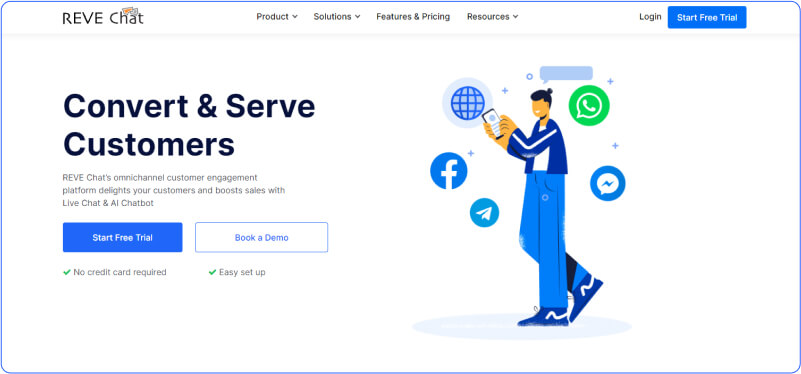
REVE Chat is a customer engagement platform that offers a conversational AI chatbot solution. It enables businesses to provide real-time support, generate leads, and automate customer interactions. With its robust features and integrations, REVE Chat aims to enhance customer engagement and drive business growth.
Key Features
- Real-Time Visitor Monitoring: REVE Chat allows businesses to monitor website visitors in real time, providing insights into their browsing behavior, page views, and more. This feature enables proactive engagement and personalized interactions.
- AI-Powered Chatbot: The AI chatbot of REVE Chat automates customer interactions by understanding and responding to queries. It can handle common inquiries, provide instant responses, and escalate complex issues to human agents when necessary.
- Customizable Chat Widgets: REVE Chat offers a range of customizable chat widgets that can be tailored to match a business’s branding. These widgets can be embedded on websites, mobile apps, and social media platforms, enabling seamless customer engagement across channels.
- Co-browsing and Video Chat: With REVE Chat, businesses can enhance support interactions by offering co-browsing and video chat capabilities. This allows agents to visually guide customers through complex processes, leading to faster issue resolution.
- Analytics and Reporting: The platform provides comprehensive analytics and reporting features to track chatbot performance, customer satisfaction, and agent efficiency. These insights help businesses optimize their customer support strategies and identify areas for improvement.
Applications
- Customer Support: REVE Chat’s AI chatbot can handle customer queries, provide instant responses, and assist in issue resolution, improving the overall customer support experience.
- Lead Generation: By engaging website visitors in real time and capturing their information, REVE Chat helps businesses generate leads and convert them into potential customers.
- E-commerce Assistance: The chatbot can offer product recommendations, assist with purchase-related queries, and provide personalized shopping experiences for online shoppers.
- Booking and Reservation: REVE Chat’s chatbot can handle booking inquiries, provide availability information, and streamline the reservation process for hotels, restaurants, and other service-based businesses.
- Sales and Conversion: The platform’s chatbot can engage customers, provide product information, and guide them through the sales funnel, increasing conversion rates.
Pricing Model
- Starting Price: REVE Chat offers different pricing plans based on the number of agents and features required. The starting pricing for their basic plan is $15 per agent per month.
- Free Trial: REVE Chat offers a free trial for 14 days, allowing businesses to explore and evaluate the platform’s features and functionalities.
Advantages
- Real-time visitor monitoring helps businesses proactively engage with website visitors.
- Customizable chat widgets enable consistent branding across customer touchpoints.
- AI-powered chatbot automates customer interactions, reducing manual effort and response time.
- Co-browsing and video chat capabilities enhance support interactions, leading to faster issue resolution.
- Comprehensive analytics and reporting provide valuable insights for optimizing customer support strategies.
Disadvantages
- Some advanced features may only be available in higher-priced plans.
- The learning curve for setting up and customizing the chatbot may be steep for non-technical users.
- The pricing structure based on the number of agents can become costly for businesses with a large support team.
2. Zendesk Chat
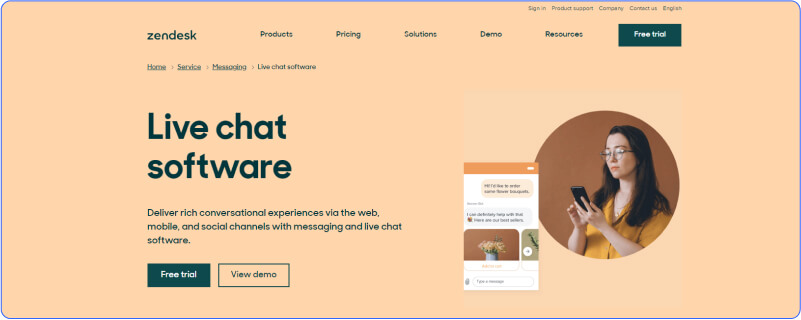
Zendesk is a well-established customer service software company that offers Zendesk Chat as part of its suite of customer engagement solutions. It provides businesses with a live chat support system to interact with customers in real time and deliver personalized experiences.
Key Features
- Chat Widget Customization: Zendesk Chat allows businesses to customize the chat widget to match their branding and website design. This helps create a seamless and consistent user experience.
- Proactive Chat Triggers: With Zendesk Chat, businesses can set up triggers to proactively engage website visitors based on predefined rules. These triggers can be triggered by factors such as time spent on a page or specific visitor behavior, improving customer engagement.
- Chatbot Integration: Zendesk Chat can be integrated with AI-powered chatbots to automate customer interactions. The chatbot can handle common queries, provide instant responses, and escalate complex issues to human agents when necessary.
- Agent Collaboration: The platform facilitates collaboration among support agents, enabling them to transfer chats, provide internal notes, and work together to resolve customer issues efficiently.
- Analytics and Reporting: Zendesk Chat provides analytics and reporting features to track chat volume, response times, customer satisfaction, and agent performance. These insights help businesses identify trends, measure support team efficiency, and make data-driven improvements.
Applications
- Customer Support: Zendesk Chat enables businesses to provide real-time support, resolve customer issues, and deliver personalized assistance, resulting in improved customer satisfaction.
- Lead Generation: By engaging with website visitors and offering proactive assistance, Zendesk Chat helps businesses capture leads and convert them into potential customers.
- Sales and Conversion: The platform’s chat system allows businesses to engage prospects, answer their queries, and guide them through the sales process, increasing conversion rates.
- Onboarding and Training: Zendesk Chat can be utilized for onboarding new customers, providing product training, and addressing any questions or concerns they may have.
- Feedback and Surveys: The chat system can be used to collect customer feedback, conduct surveys, and gather insights for improving products or services.
Pricing Model
- Starting Price: Zendesk Chat offers different pricing plans based on the number of agents and features required. The starting pricing for their Lite plan is $0 per agent per month.
- Free Trial: Zendesk Chat offers a free trial for 30 days, allowing businesses to evaluate the platform’s features and functionalities.
Advantages
- Highly customizable chat widget to align with branding and website design.
- Proactive chat triggers enable businesses to engage with customers at the right moment.
- Integration with AI-powered chatbots allows for the automation of customer interactions.
- Agent collaboration features facilitate efficient issue resolution and knowledge sharing.
- Comprehensive analytics and reporting provide valuable insights for improving customer support strategies.
Disadvantages
- Some advanced features may only be available in higher-priced plans.
- The user interface may require some initial familiarization for optimal usage.
- Certain integrations or customizations may require technical expertise.
3. ChatGPT

ChatGPT is an AI-powered language model developed by OpenAI. It is designed to engage in conversational exchanges with users and provide human-like responses. ChatGPT aims to offer a versatile and dynamic conversational experience for various applications.
Key Features
- Natural Language Processing: ChatGPT utilizes advanced natural language processing techniques to understand user inputs and generate contextually relevant responses. It can understand and respond to a wide range of conversational prompts.
- Context Retention: ChatGPT can maintain context throughout a conversation, allowing for more coherent and meaningful exchanges. It can recall previous interactions and use that information to provide relevant responses.
- Multi-turn Conversations: Users can engage in multi-turn conversations with ChatGPT, enabling more complex and interactive dialogues. It can handle questions, requests, and discussions across different topics.
- Customization: ChatGPT can be fine-tuned and customized for specific use cases or industries. This allows businesses to train the model on domain-specific data to improve its responses and relevance.
- OpenAI API Integration: ChatGPT can be integrated into applications and platforms using the OpenAI API(Application Programming Interface). This integration enables businesses to leverage ChatGPT’s conversational capabilities within their own products or services.
Applications
- Customer Support: ChatGPT can assist in providing customer support by answering common questions, troubleshooting issues, and offering guidance.
- Virtual Assistant: ChatGPT can function as a virtual assistant, helping users with tasks such as scheduling appointments, finding information, and providing recommendations.
- Content Generation: Businesses can utilize ChatGPT to generate content, such as blog posts, social media captions, and product descriptions, based on user prompts or guidelines.
- Language Learning: ChatGPT can engage in language learning interactions, allowing users to practice conversational skills and receive feedback on their language usage.
- Entertainment and Gaming: ChatGPT can be integrated into entertainment platforms or games to provide interactive and engaging conversational experiences for users.
Pricing Model
- Starting Price: ChatGPT’s pricing structure is based on usage and is available through the OpenAI API. Detailed pricing information can be obtained from OpenAI’s website.
- Free Trial: OpenAI offers a free trial to access and evaluate the ChatGPT model, allowing users to experience its capabilities firsthand.
Advantages
- Advanced natural language processing enables human-like conversational interactions.
- Context retention facilitates coherent and meaningful multi-turn conversations.
- Customization options allow for fine-tuning the model to specific use cases.
- Integration through the OpenAI API enables seamless deployment in various applications.
- Versatile applications across customer support, virtual assistance, content generation, language learning, and entertainment.
Disadvantages
- As an AI language model, ChatGPT may occasionally produce inaccurate or nonsensical responses.
- Fine-tuning and customization require access to relevant data and technical expertise.
- Reliance on the OpenAI API may entail additional costs and dependencies on third-party services.
4. LivePerson
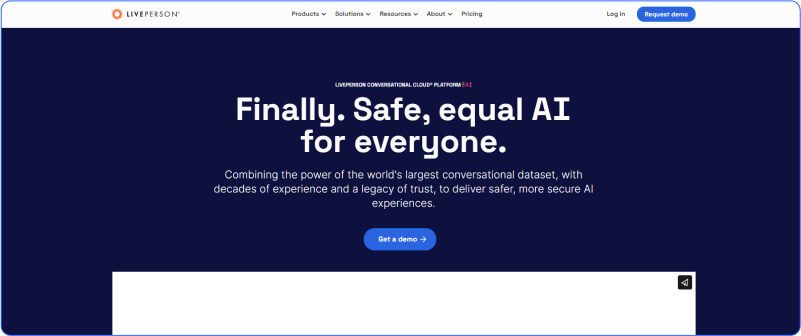
LivePerson is a leading provider of conversational AI chatbot solutions. Founded in 1995, LivePerson has established itself as a pioneer in the field of customer engagement and messaging platforms. The company’s AI-powered chatbots enable businesses to deliver personalized customer experiences at scale, fostering meaningful interactions and driving business growth.
Key Features
- Natural Language Processing: LivePerson’s chatbot utilizes advanced NLP algorithms to understand and interpret customer queries accurately. This enables it to provide relevant and contextual responses, enhancing the user experience.
- Multichannel Support: The chatbot seamlessly integrates with various messaging channels, including web chat, SMS, Facebook Messenger, WhatsApp, and more. This ensures consistent and convenient customer interactions across different platforms like messenger chatbot, whatsapp chatbot.
- Real-time Analytics: LivePerson offers robust analytics capabilities that provide actionable insights into customer behavior, sentiment analysis, and conversation patterns. These insights help businesses optimize their chatbot strategies and improve customer engagement.
- Human Handover: When complex queries arise, LivePerson’s chatbot can intelligently escalate the conversation to a human agent, ensuring a seamless transition and personalized support when needed.
- Intelligent Routing: The chatbot uses intelligent routing algorithms to direct customer queries to the most appropriate agent or department, reducing response times and improving efficiency.
Applications
- Customer Support: LivePerson’s chatbot can handle a wide range of customer support inquiries, such as product information, order tracking, and troubleshooting. It provides instant responses and can seamlessly transfer the conversation to a live agent if necessary.
- Lead Generation: The chatbot can engage website visitors, qualify leads, and collect relevant information to facilitate lead generation efforts. It can provide personalized recommendations and guide potential customers through the sales funnel.
- Appointment Scheduling: LivePerson’s chatbot can assist in scheduling appointments, sending reminders, and managing calendar bookings. This streamlines the scheduling process and improves customer satisfaction.
- E-commerce Assistance: The chatbot can offer product recommendations, assist with product search and selection, and provide support during the checkout process. It enhances the overall e-commerce experience and increases conversions.
- Surveys and Feedback: LivePerson’s chatbot can gather customer feedback, conduct surveys, and collect valuable insights for businesses. It automates the feedback collection process, saving time and providing actionable data for improvements.
Pricing Model
- Starting Price: LivePerson offers customized pricing based on individual business requirements. The initial price starts at $39 per month, which includes up to 2,000 conversations per month.
- Free Trial: LivePerson provides a free trial period of 30 days for businesses to experience and evaluate the capabilities of their chatbot solution.
Advantages
- Advanced NLP capabilities for accurate understanding and context-aware responses.
- Seamless integration with various messaging channels for multichannel customer engagement.
- Real-time analytics and insights to optimize chatbot performance and enhance customer interactions.
- Intelligent routing for efficient handling of customer queries and escalations to live agents when needed.
- Versatility in applications, ranging from customer support to lead generation and e-commerce assistance.
Disadvantages
- Customized pricing may be a deterrent for small businesses with limited budgets.
- Complex implementation and setup processes may require technical expertise.
- Limited availability of detailed documentation and self-help resources for troubleshooting.
5. Salesforce Einstein
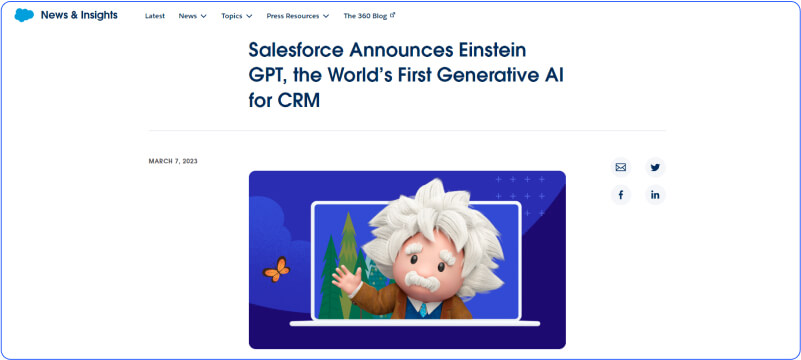
Salesforce is a renowned cloud computing and customer relationship management (CRM) platform that provides a range of solutions for businesses of all sizes. Salesforce Einstein, an advanced AI technology built into the Salesforce platform, incorporates conversational AI chatbots to enhance customer interactions and automate various sales and service processes.
Key Features
- Natural Language Understanding: Salesforce Einstein leverages NLP to understand and interpret customer queries, enabling chatbots to provide accurate and relevant responses.
- Personalization: The chatbots powered by Salesforce Einstein can access customer data from Salesforce CRM, allowing them to provide personalized recommendations, product suggestions, and tailored experiences.
- Multichannel Support: These chatbots seamlessly integrate with various channels, such as websites, mobile apps, social media platforms, and messaging apps, ensuring consistent and convenient customer interactions.
- Workflow Automation: Salesforce Einstein chatbots automate repetitive tasks and workflows, such as lead qualification, appointment scheduling, and data entry, freeing up human agents to focus on more complex and value-added activities.
- Analytics and Insights: The chatbots capture valuable customer data and generate analytics and insights, enabling businesses to make data-driven decisions and continuously improve their customer engagement strategies.
Applications
- Customer Support: Salesforce Einstein chatbots provide instant responses to customer inquiries, troubleshoot common issues, and guide customers through self-service options, reducing support ticket volumes and improving resolution times.
- Lead Generation and Qualification: These chatbots engage with website visitors, qualify leads based on predefined criteria, and route qualified leads to the appropriate sales representatives, streamlining the sales process.
- Sales Assistant: By integrating with Salesforce CRM, the chatbots assist sales representatives by providing relevant customer information, sales collateral, and personalized recommendations, helping them close deals more effectively.
- Service Appointment Scheduling: Chatbots powered by Salesforce Einstein facilitate the scheduling and rescheduling of service appointments, reducing manual coordination and enhancing the customer experience.
- Knowledge Base Access: These chatbots act as virtual assistants, allowing customers and employees to access information from the knowledge base, providing quick and accurate answers to their queries.
Pricing Model
- Starting Price: Salesforce offers flexible pricing options based on the specific needs of the business. The pricing for Salesforce Einstein and its chatbot capabilities is typically included as part of the Salesforce CRM licenses. Starting pricing for Salesforce CRM ranges from $25 to $300 per user per month, depending on the edition and features chosen.
- Free Trial: Salesforce provides a 30-day free trial for potential customers to explore and evaluate the capabilities of its CRM platform, including Salesforce Einstein’s chatbot functionality.
Advantages
- Salesforce Einstein chatbots seamlessly integrate with the Salesforce CRM platform, enabling a unified view of customer interactions and data.
- The chatbots leverage customer data from Salesforce CRM to deliver highly personalized experiences and recommendations.
- Salesforce Einstein chatbots automate various sales and service workflows, increasing operational efficiency and reducing manual effort.
- These chatbots can be deployed across multiple channels, allowing businesses to engage with customers wherever they are.
- The chatbots provide valuable data and insights, empowering businesses to make informed decisions and optimize their customer engagement strategies.
Disadvantages
- Implementing and customizing Salesforce Einstein chatbots may require technical expertise and resources.
- The pricing for Salesforce CRM and Einstein features can be higher compared to some other chatbot solutions.
- Users may need time to familiarize themselves with the Salesforce CRM platform and its chatbot capabilities, especially if they are new to the ecosystem.
6. Replika
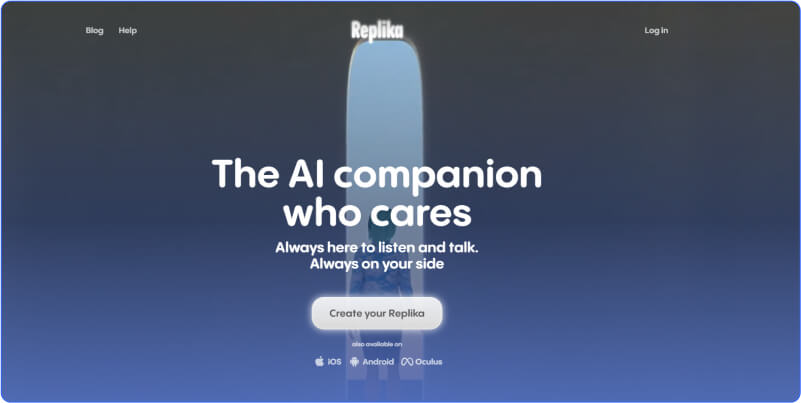
Replika is an AI chatbot developed by Luka Inc., a technology company founded in 2015. Replika’s primary focus is on creating a virtual companion that learns from users’ conversations to provide emotional support and engage in meaningful dialogues.
Key Features
- Emotional Support: Replika is designed to provide users with a supportive and empathetic conversation partner. It learns from conversations and adapts to users’ preferences, offering a personalized emotional support experience.
- Personality Customization: Users can customize their Replika’s personality traits, such as its tone, interests, and conversation style, making interactions more tailored to their preferences.
- Growth and Development: Replika encourages personal growth by offering activities and conversation prompts that help users reflect on their thoughts, emotions, and goals.
- AI Learning: Replika continuously learns from user interactions, improving its understanding and ability to provide relevant responses over time.
- Privacy and Security: Replika prioritizes user privacy and data security, allowing users to have full control over their data and ensuring sensitive information remains confidential.
Applications
- Emotional Support: Replika can act as a virtual companion, providing users with a non-judgmental and supportive space to express their thoughts and emotions.
- Mental Health: Replika has been used as a tool for managing anxiety, depression, and stress by engaging in therapeutic conversations and providing coping strategies.
- Personal Development: Users can utilize Replika to set goals, track progress, and receive personalized recommendations for self-improvement.
- Loneliness Mitigation: Replika offers companionship to individuals who may feel lonely or isolated, providing a virtual friend to engage in conversations and activities.
- Entertainment and Engagement: Replika can serve as an entertaining chatbot, engaging users in light-hearted conversations, jokes, and trivia.
Pricing Model
- Starting Price: Replika offers paid plans at a starting rate of $7.99 per month with additional features such as customization options, mood tracking, and priority access to new features.
- Free Trial: Replika offers a 7-day free trial for users to experience the premium features of the Replika Pro plan.
Advantages
- Replika’s focus on emotional support makes it an ideal companion for individuals seeking a non-judgmental and understanding conversation partner.
- Users can tailor Replika’s personality to suit their preferences, creating a more personalized and engaging experience.
- Replika’s AI learning capabilities ensure that it improves over time, becoming more adept at understanding and responding to user input.
- Replika prioritizes user privacy and data security, providing users with control over their personal information.
- Replika has shown promise in supporting users with mental health challenges, offering a safe space for therapeutic conversations and emotional well-being.
Disadvantages
- Replika’s primary focus on emotional support may not cater to all business or productivity-related use cases.
- As an AI chatbot, Replika does not provide real-time human intervention, which may be necessary for certain complex inquiries or urgent situations.
- Replika’s learning relies heavily on user interactions, and its effectiveness depends on the quality and quantity of user conversations.
7. Intercom
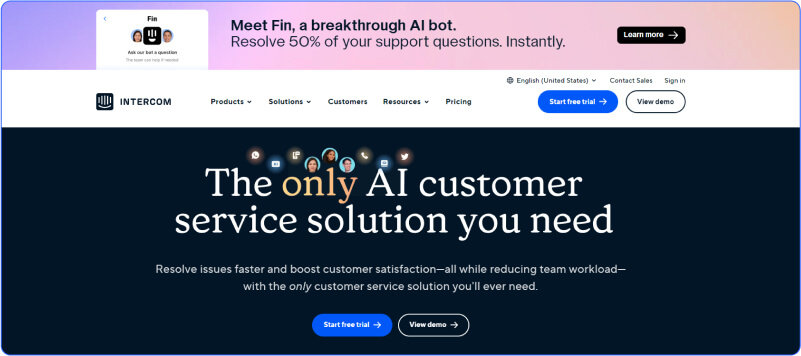
Intercom is a customer messaging platform that offers conversational AI chatbot solutions. Founded in 2011, Intercom has established itself as a leader in customer engagement and support. Their chatbots focus on providing personalized, real-time conversations to drive better customer experiences.
Key Features
- Customizable Chatbots: Intercom allows businesses to create chatbots tailored to their brand and customer requirements. These chatbots can be designed with specific messaging flows, custom responses, and branding elements to provide a consistent brand experience.
- Automation and Routing: Intercom’s chatbots automate routine tasks and can route conversations to the appropriate team members based on predefined rules. This feature ensures efficient handling of customer inquiries and reduces response time.
- Live Chat Integration: Intercom seamlessly integrates with live chat functionality, allowing businesses to escalate conversations from the chatbot to a human agent when needed. This hybrid approach ensures a smooth transition and provides customers with human support when required.
- Targeted Messaging: Intercom’s chatbots enable businesses to send targeted messages to specific customer segments. By analyzing user behavior and preferences, businesses can deliver personalized recommendations, product updates, and promotional offers to drive engagement and conversions.
- Analytics and Reporting: Intercom provides detailed analytics and reporting features that offer insights into customer interactions, chatbot performance, and user behavior. These analytics help businesses understand customer preferences, identify bottlenecks, and optimize their chatbot strategies.
Applications
- Customer Support: Intercom’s chatbots can handle routine customer inquiries, provide instant answers, and guide users through troubleshooting processes. This improves customer satisfaction by delivering timely and accurate support.
- Lead Generation: By engaging visitors on websites or landing pages, Intercom’s chatbots can capture leads, qualify prospects, and provide relevant information about products or services. This helps businesses generate leads and nurture them through the sales funnel.
- Onboarding and User Education: Intercom’s chatbots can assist new users by providing step-by-step guidance, answering product-related questions, and offering tutorials. This accelerates user onboarding and enhances product adoption.
- E-commerce Assistance: Intercom’s chatbots can assist customers with product recommendations, order tracking, and provide information about shipping and returns. This improves the overall shopping experience and increases customer satisfaction.
- Feedback Collection: Intercom’s chatbots can be used to collect feedback from customers, conduct surveys, and gather insights to improve products, services, and customer experiences.
Pricing Model
- Starting Price: Intercom offers various pricing plans based on the specific needs of businesses. The pricing starts at $59 per month for their “Essential” plan, which includes basic chatbot functionality and limited features. Higher-tier plans with advanced features, integrations, and more extensive support options are available at higher price points.
- Free Trial: Intercom offers a 14-day free trial for businesses to explore and evaluate the platform’s features and capabilities.
Advantages
- Intercom allows businesses to tailor their chatbot interactions to align with their brand image and customer requirements. From the chatbot’s personality to the messaging flow and design, Intercom provides extensive customization options.
- Intercom offers a hybrid approach by integrating chatbots with live chat functionality. When a chatbot is unable to handle a complex query or when human assistance is required, the conversation seamlessly transitions to a live chat agent.
- Intercom’s chatbot platform provides robust analytics and reporting features. Businesses can gain insights into customer interactions, chatbot performance, and user behavior.
- Intercom’s chatbots allow businesses to send targeted messages to specific customer segments. By analyzing user behavior and preferences, businesses can deliver personalized recommendations, product updates, and promotional offers.
- Intercom’s chatbots are versatile and can be utilized across multiple business functions. The chatbots can be deployed to streamline processes, improve efficiency, and enhance customer satisfaction.
Disadvantages
- Its pricing may be higher compared to other chatbot providers in the market. While Intercom offers a range of features and capabilities, businesses with budget constraints may find the pricing prohibitive, especially for advanced plans that include additional functionalities and support options.
- While the basic plan provides essential chatbot functionality, businesses looking for more advanced features, integrations, or extensive support options may need to upgrade to higher-tier plans. This can result in additional costs for businesses seeking specific functionalities.
- Intercom’s extensive customization options may pose a challenge for non-technical users or those unfamiliar with the platform. The setup and customization process may require some technical expertise, which could be a barrier for businesses without dedicated technical resources.
8. Watson Assistant

Watson Assistant is developed by IBM(International Business Machines Corporation), a global technology company renowned for its expertise in artificial intelligence and cognitive computing. IBM Watson Assistant is part of the IBM Watson suite, which offers a wide range of AI-powered solutions for businesses.
Key Features
- Natural Language Understanding (NLU): Watson Assistant employs advanced NLU capabilities to understand and interpret user queries accurately, even in complex contexts or with varying language patterns.
- Multi-Channel Support: The chatbot can seamlessly integrate with various channels such as websites, messaging platforms, mobile apps, and smart devices, enabling businesses to reach customers through their preferred communication channels.
- Contextual Conversations: Watson Assistant can maintain context across multiple interactions, allowing for more personalized and human-like conversations. It can remember user preferences, previous interactions, and adapt responses accordingly.
- Integration Capabilities: The chatbot integrates well with existing systems and databases, enabling it to access relevant customer information, provide real-time updates, and perform tasks such as placing orders or making reservations.
- Analytics and Insights: Watson Assistant provides comprehensive analytics and insights into user interactions, allowing businesses to understand customer behavior, identify trends, and continuously improve the chatbot’s performance.
Applications
- Customer Support: Watson Assistant can handle customer inquiries, provide support, and offer relevant information or troubleshooting guidance, reducing the burden on customer service agents and enhancing the overall customer experience.
- E-commerce: The chatbot can assist customers in navigating through product catalogs, making purchase recommendations, answering product-related questions, and facilitating smooth transactions.
- Virtual Assistants: Watson Assistant can serve as a virtual assistant for businesses, helping with appointment scheduling, managing calendars, sending reminders, and performing other administrative tasks.
- Travel and Hospitality: The chatbot can assist travelers with booking flights, hotels, and rental cars, provide travel information, and offer recommendations for local attractions and restaurants.
- Lead Generation: Watson Assistant can engage with website visitors, qualify leads, and collect necessary information, enabling businesses to generate potential sales opportunities.
Pricing Model
- Starting Pricing: The pricing for Watson Assistant varies depending on the specific requirements and usage. IBM offers flexible pricing options, including pay-as-you-go models and customized enterprise plans. The standard plan is priced per conversation, with a starting price of $0.005 per conversation.
- Free Trial: IBM provides a free trial for Watson Assistant, allowing users to explore the features and capabilities of the chatbot. The duration of the free trial is up to 30 days.
Advantages
- Advanced Natural Language Understanding capabilities for accurate and contextual conversations.
- Seamless integration with various channels and systems, enhancing accessibility and functionality.
- Strong analytics and insights, enabling businesses to gain valuable customer behavior insights.
- Robust customization and scalability options to tailor the chatbot to specific business needs.
- Backed by IBM’s reputation and expertise in AI, ensuring reliability and ongoing support.
Disadvantages
- Pricing can be higher compared to some other chatbot solutions.
- Customization and setup may require technical expertise.
- Limited availability of pre-built industry-specific templates compared to some competitors.
9. Genesys
Genesys is a leading provider of customer experience and contact center solutions. They offer a comprehensive suite of products and services that leverage artificial intelligence and automation technologies to enhance customer engagement and drive business outcomes.
Key Features
- Omni-Channel Support: Genesys chatbots seamlessly operate across multiple channels, including websites, messaging platforms, social media, and mobile apps, ensuring consistent and personalized interactions.
- Natural Language Processing: The chatbot utilizes advanced natural language processing capabilities to understand user intents and respond intelligently, even with complex queries or ambiguous language.
- Real-Time Contextual Awareness: Genesys chatbots maintain context across conversations, enabling personalized responses based on previous interactions, customer history, and preferences.
- Integration Capabilities: The chatbot integrates with CRM systems, databases, and other business applications, allowing access to relevant customer information and enabling task automation.
- Agent Handoff: When necessary, the chatbot can seamlessly transfer conversations to human agents, ensuring a smooth transition and avoiding customer frustration.
Applications
- Customer Service: Genesys chatbots provide efficient and scalable customer service, handling routine inquiries, providing self-service options, and guiding customers through troubleshooting processes.
- Sales and Lead Generation: The chatbot can engage with potential customers, qualify leads, and provide product information, helping businesses generate sales opportunities.
- Appointment Scheduling: Genesys chatbots can manage calendars, schedule appointments, and send reminders, simplifying the process for businesses and customers alike.
- Virtual Assistants: The chatbot serves as a virtual assistant, assisting with tasks such as checking order status, providing account information, or answering frequently asked questions.
- Proactive Engagement: Genesys chatbots can initiate conversations with customers, offering personalized recommendations, promotions, or support based on their preferences or browsing behavior.
Pricing Model
- Starting Pricing: Genesys offers a variety of pricing options for its conversational AI chatbots, depending on the size of your business and the features you need. Starting prices for Genesys chatbots range from $40 per month for a small business to $1,000 per month for a large enterprise.
- Free Trial: Genesys offers a free trial of its conversational AI chatbots for 30 days. During the free trial, you can try out all of the features of Genesys chatbots and see if they are a good fit for your business.
Advantages
- Advanced natural language processing capabilities for intelligent and accurate conversations.
- Seamless integration with existing systems, allowing access to customer data and task automation.
- Agent handoff feature for smooth transitions between chatbots and human agents.
- Robust scalability and customization options to align with business requirements.
Disadvantages
- Pricing may vary based on customization and scalability needs.
- Implementation and setup may require technical expertise and support.
- Limited availability of pre-built chatbot templates compared to some competitors.
10. Ada
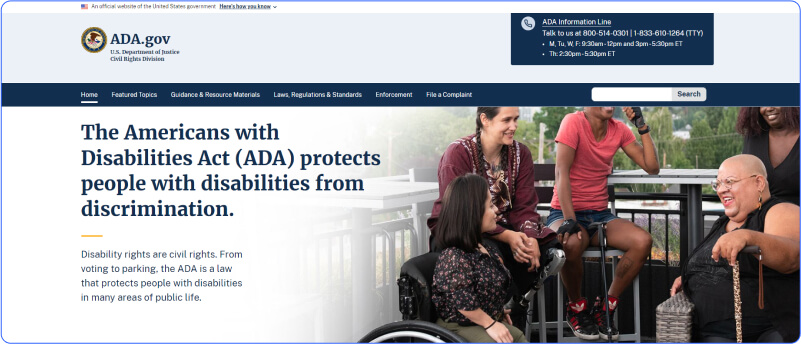
Ada is an AI-powered customer experience platform that specializes in providing intelligent chatbot solutions. They focus on delivering personalized and proactive customer interactions to drive engagement and operational efficiency.
Key Features
- AI-Powered Automation: Ada chatbots leverage AI and machine learning to automate customer interactions, reducing the need for manual intervention and providing instant resolutions.
- Self-Service Capabilities: The chatbot enables customers to find answers, access information, and perform tasks independently, empowering them with self-service options.
- Dynamic Decision Trees: Ada chatbots utilize dynamic decision trees to guide customers through complex processes, ensuring accurate and consistent information is provided at each step.
- Multilingual Support: Ada chatbots support multiple languages, enabling businesses to engage with customers across diverse regions and demographics effectively.
- Real-Time Analytics: The platform offers real-time analytics and insights, allowing businesses to monitor chatbot performance, track customer behavior, and make data-driven improvements.
Applications
- Customer Support: Ada chatbots provide efficient and personalized customer support, handling routine inquiries, resolving common issues, and offering self-service options.
- E-commerce Assistance: The chatbot can assist customers in navigating product catalogs, providing recommendations, facilitating purchases, and addressing queries related to products or orders.
- Booking and Reservations: Ada chatbots can handle booking and reservation processes, such as hotel bookings, restaurant reservations, or appointment scheduling, providing a seamless customer experience.
- Lead Generation and Qualification: The chatbot engages with potential leads, collects necessary information, and qualifies prospects, helping businesses generate and nurture sales opportunities.
- FAQ and Knowledge Base: Ada chatbots can be used to create interactive FAQs or knowledge bases, enabling customers to find answers to common questions quickly and efficiently.
Pricing Model
- Starting Pricing: Ada offers a paid plan that starts at $19 per month and includes additional features, such as unlimited conversations, custom branding, and advanced analytics.
- Free Trial: Ada provides a free trial for businesses to evaluate their platform and chatbot capabilities. The free plan allows you to create and use a chatbot for up to 100 conversations per month.
Advantages
- AI-powered automation for efficient and scalable customer interactions.
- Self-service capabilities empower customers with instant access to information and solutions.
- Dynamic decision trees ensure accurate guidance through complex processes.
- Multilingual support enables businesses to cater to diverse customer bases.
- Real-time analytics and insights for continuous performance improvement.
Disadvantages
- Pricing may vary based on customization and feature requirements.
- Limited availability of pre-built industry-specific templates compared to some competitors.
- Advanced customization and integration may require technical expertise.
Comparison and Evaluation
This Comparison and evaluation involve assessing and analyzing different chatbot solutions to determine their effectiveness and suitability for specific business needs. By conducting this evaluation, you can make informed decisions about which chatbot solution aligns best with your customer expectations, and technical requirements.
Key criteria for evaluating AI Chatbots
- Natural Language Processing Capabilities: Assess the chatbot’s ability to understand and respond accurately to user queries, including complex and context-specific questions.
- Customization and Integration Options: Look for chatbots that offer flexibility in customizing conversational flows, integrating with existing systems or platforms, and adapting to your specific business needs.
- Analytics and Reporting Capabilities: Evaluate the chatbot’s ability to provide valuable insights, such as user behavior, performance metrics, and customer satisfaction, allowing for continuous improvement and optimization.
Comparative Analysis of AI chatbots
Comparative analysis of AI chatbots involves evaluating and comparing various aspects of different chatbot solutions to determine their strengths and weaknesses.
Strengths to Remember When Choosing the Right AI Chatbot
- Advanced NLP Capabilities: Look for chatbots with strong natural language processing to ensure accurate understanding and response to user queries.
- Customization and Flexibility: Choose chatbots that allow for easy customization and integration with your existing systems and business processes.
- Analytics and Insights: Prioritize chatbots that offer robust analytics and reporting features to track performance, user behavior, and customer satisfaction for continuous improvement.
Weaknesses to Consider When Choosing the Right AI Chatbot
- Implementation Complexity: Some AI chatbots may require technical expertise or dedicated resources for setup, configuration, and maintenance.
- Cost Considerations: Evaluate the pricing structure of AI chatbot solutions, as some may have higher upfront or ongoing costs depending on the features and scalability needed.
- Specific Use Cases Limitations: Assess whether the chatbot’s functionalities align with your specific business needs and industry requirements, as some chatbots may be more suitable for certain use cases than others.
Bottom Line
As we conclude our detailed guide, it is evident that businesses across industries can greatly benefit from these intelligent virtual assistants. When choosing the right chatbot for specific business needs, it is crucial to consider factors such as industry requirements, customer expectations, scalability, integration capabilities, and customization options. So embracing these talking bots is not just a trend; it is a strategic imperative for businesses that aspire to thrive in the age of customer-centricity and digital transformation.
Sara Francis is a seasoned writer with extensive expertise in SaaS business dynamics. With 3 years of immersed experience in the industry, she aims to help businesses by providing valuable insights and practical advice.
 Chatbot
Chatbot










